MercoPress. South Atlantic News Agency
Tag: Nelson Merentes
-
Tuesday, February 10th 2015 - 23:58 UTC
Venezuela announces yet another concealed devaluation, effective Wednesday
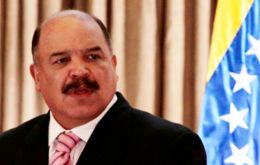
Venezuela's vice president for economic policy announced Tuesday that the government will inaugurate this week a three-tiered exchange-rate regime which includes a “totally free” market open to both individuals and companies.
-
Wednesday, September 11th 2013 - 22:06 UTC
Venezuela inflation running at annualized 45.4%; government “admits economic success debt”
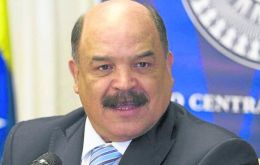
Venezuela's annual inflation rate hit 45.4% in August, the central bank revealed this week, the highest in five years and the highest in the region, even as consumer price increases slowed from the previous month.
-
Monday, April 22nd 2013 - 07:43 UTC
Mathematician will be responsible for putting Venezuelan inflation back on its feet

President Nicolas Maduro replaced Venezuelan Finance Minister Jorge Giordani, appointing central bank chief Nelson Merentes in his place two days after being sworn in as Hugo Chavez's successor.
-
Thursday, December 27th 2012 - 19:49 UTC
Maduro with more power on economic affairs; devaluation of the Bolivar in the agenda

Venezuelan president Hugo Chavez delegated certain responsibilities in economic affairs to Vice-President Nicolas Maduro including the right to authorize debt sales and seize assets. The announcement comes at a moment when significant economic decisions must be taken following the profligate spending leading to last October’s election.
-
Thursday, August 9th 2012 - 06:33 UTC
Venezuela inflation slows down for seventh month running: 19.4% in last 12 months

Venezuela's annual inflation slowed for a seventh straight month in July, coming in below 20% for the first time in years. Finance Minister Jorge Giordani said annual inflation to July was 19.4% percent, below the 20 to 22% estimated in the government's budget for this year.
-
Monday, January 2nd 2012 - 21:44 UTC
Venezuelan economy expands 4% in 2010 and inflation reaches 27.6%
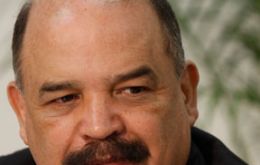
Inflation in Venezuela during last year reached 27.6%, which is 0.7 percentage points more than in 2010, according to a preliminary report from Venezuela’s central bank. President Nelson Merentes said that the consumer prices index “was associated to the upwards pressure generated on wholesale prices by a greater dynamism from domestic aggregate demand”.
-
Monday, August 22nd 2011 - 07:10 UTC
Venezuela has requested 99 tons of gold holdings from the Bank of England
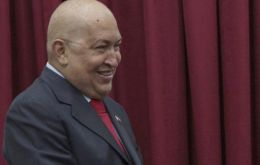
Venezuela’s central bank has requested its 99 tons of gold holdings from the Bank of England, according to a bank statement sent by e-mail, citing the institution’s president Nelson Merentes.
-
Wednesday, April 6th 2011 - 06:32 UTC
Venezuela admits an annual inflation of 27.4% in the last twelve months

Venezuela's nationwide consumer price index (NCPI), prepared by the Central Bank of Venezuela (BCV) and the National Statistics Institute (INE), showed a 1.4% increase in March 2011 compared to February 2011.
-
Thursday, January 6th 2011 - 21:08 UTC
Second contraction year for Venezuela; 2% expansion forecasted in 2011
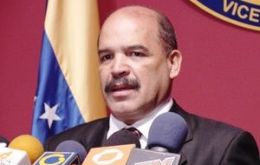
Venezuela’s economy contracted 1.9% 2010, marking a second year of recession according to a release from the Central Bank. The economy shrank 3.3% in 2009, but President Hugo Chavez's government said the country is now pulling out of recession and on course for 2% growth in 2011.
